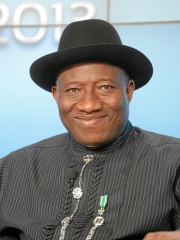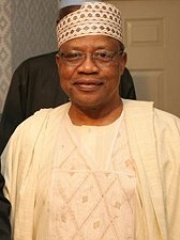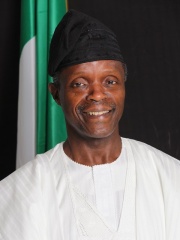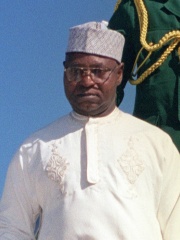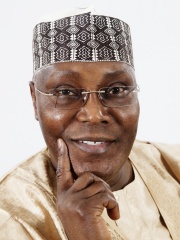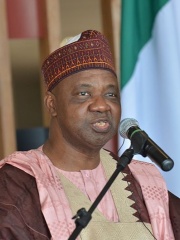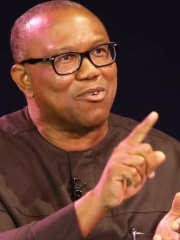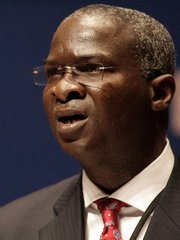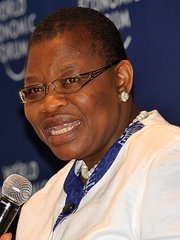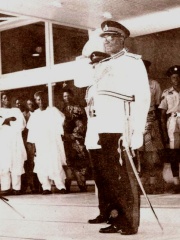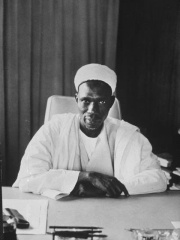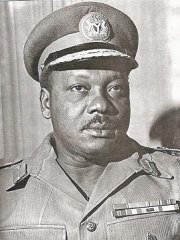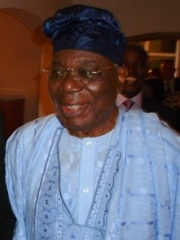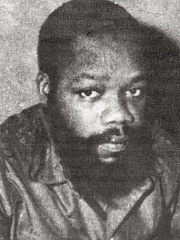
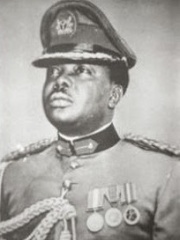
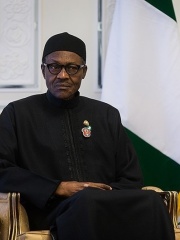
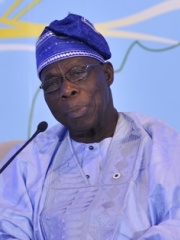
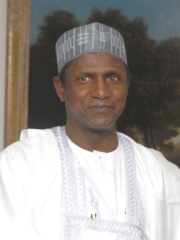
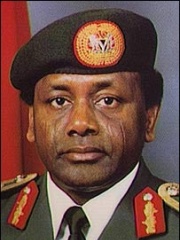
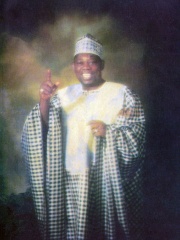
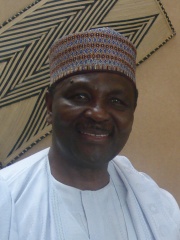
The Most Famous
POLITICIANS from Nigeria
This page contains a list of the greatest Nigerian Politicians. The pantheon dataset contains 19,576 Politicians, 29 of which were born in Nigeria. This makes Nigeria the birth place of the 92nd most number of Politicians behind Madagascar, and Montenegro.
Top 10
The following people are considered by Pantheon to be the top 10 most legendary Nigerian Politicians of all time. This list of famous Nigerian Politicians is sorted by HPI (Historical Popularity Index), a metric that aggregates information on a biography's online popularity. Visit the rankings page to view the entire list of Nigerian Politicians.

1. C. Odumegwu Ojukwu (1933 - 2011)
With an HPI of 68.97, C. Odumegwu Ojukwu is the most famous Nigerian Politician. His biography has been translated into 25 different languages on wikipedia.
Chukwuemeka Odumegwu Ojukwu (4 November 1933 – 26 November 2011) was a Nigerian military officer and political figure who served as President of Biafra from 1967 to 1970. As the military governor of the Eastern Region of Nigeria, which he declared as the independent state of Biafra, Ojukwu led the Biafran forces during the Nigerian Civil War against the Nigerian government forces. Born in Zungeru, British Nigeria to Louis Odumegwu Ojukwu, a wealthy Igbo businessman, Ojukwu was educated at King's College, Lagos and Epsom College in Surrey, England. He proceeded to Lincoln College, Oxford University where he obtained a master's degree in Modern History in 1955. He returned to Nigeria to serve as an administrative officer and would later join the Nigerian army. Following the independence of Nigeria in 1960, a group of military officers overthrew Nigeria's civilian government in the 1966 Nigerian coup d'état and Johnson Aguiyi-Ironsi became the head of state. Ironsi appointed Ojukwu as military governor of the Eastern Region mostly dominated by the Igbo tribe. In response to the demands of the protection of the Igbos in the then-Eastern region from being killed in several parts of the country - particularly the Northern parts of Nigeria, Ojukwu reorganised the Eastern Region as the Republic of Biafra, and he declared independence from Nigeria. Nigeria invaded Biafra, sparking the Nigerian Civil War which has been argued in many quarters as a genocide against the Igbos of the then-Eastern region. The Nigerian military, with support from the United Kingdom and the Soviet Union, blockaded Biafra and cut food supplies, which created a mass famine. Ojukwu made use of foreign media to highlight the plight of Biafran civilians and depict the war as genocide against Igbos. The shocking images of starving Biafran civilians turned the war into an international media sensation, as this was one of the first globally televised wars alongside the Vietnam War. Biafra received international humanitarian relief during the Biafran airlift. Biafra eventually capitulated to Nigerian forces in 1970 after millions of Biafran civilians died. Ojukwu subsequently fled to Ivory Coast in exile, where President Félix Houphouët-Boigny, who recognised Biafra as a sovereign and independent state, granted him political asylum. In 1981, newly democratically elected Nigerian president Shehu Shagari granted amnesty to Ojukwu, allowing him to return to Nigeria without facing political or legal consequences from the war. Ojukwu spent the remainder of his life unsuccessfully attempting to return to Nigerian politics as a democratically elected politician rather than a military ruler. He died in 2011 at the age of 78 in London, England. His body was returned to Nigeria, where Nigerian president Goodluck Jonathan arranged a state funeral. He was buried with full military honours, including a 21-gun salute from the Nigerian Army, and thousands of people attended his funeral. Ojukwu remains a contentious figure in the history of Nigeria. Many Igbo people regard him as a hero and a messianic figure who did what was necessary to ensure the survival of Nigeria's Eastern population while facing the possibility of a genocide after the 1966 coup. Other Nigerians have deemed Biafra's secession unnecessary, blaming Ojukwu for the events of the war and accusing him of oppressing Biafra's non-Igbo ethnic minorities.

2. Murtala Mohammed (1938 - 1976)
With an HPI of 67.49, Murtala Mohammed is the 2nd most famous Nigerian Politician. His biography has been translated into 30 different languages.
Murtala Ramat Muhammed (; 8 November 1938 – 13 February 1976) was a Nigerian military officer and the fourth head of state of Nigeria. He led the 1966 Nigerian counter-coup in overthrowing the military regime of Johnson Aguiyi-Ironsi and featured prominently during the Nigerian Civil War and thereafter ruled Nigeria from 29 July 1975 until his assassination on 13 February 1976. This period in Nigerian history, from the Northern counter-coup victory to Murtala's death, is commonly associated with the institutionalization of the military in Nigerian politics. Born in Kano to a native Hausa parents, Mohammed Riskuwa and Uwani Ramatu from Kano state. Murtala served in the Nigerian Army as a cadet in the Royal Military Academy, Sandhurst. He later served in Congo; eventually rose through the ranks to become brigadier general in 1971, aged 33, becoming one of the youngest generals in Nigeria. Three years later, Murtala became the Federal Commissioner for Communications in Lagos. As a conservative and federalist, Murtala regretted the overthrow of the First Republic and the promulgation of Aguiyi Ironsi's unification decree of 1966. He was devastated by the assassination of Sir Ahmadu Bello, and for a time seriously considered the secession of Northern Nigeria. His career redoubled after Chukwuma Kaduna Nzeogwu and the young majors orchestrated the first military coup in Nigeria of 1966 empowering him to lead the mutiny of the night of 29 July 1966 in Abeokuta. Murtala was briefly considered as Supreme Commander before the appointment of Yakubu Gowon. During the war, he commanded Nigeria's Second Infantry Division which committed the Asaba massacre and was responsible for the death of civilians and many of the rebels. Three years later the Federal military government declared victory which bolstered Murtala's image over Nigeria and in particular the north as a military leader through the post-war era of "reconciliation, reconstruction, and rehabilitation". In post-civil-war Nigeria, Murtala ruled with more power than any Nigerian leader before or since and developed a charismatic authority and cult of personality. During the Cold War he maintained Nigerian neutrality through participation in the non-aligned movement but supported the Soviet Union — during the latter's effort in the Angolan Civil War. This support is better understood within the context of the liberation of African countries from colonialism than as support for the Soviet Union. At the same time, his regime transitioned from being authoritarian into consensus decision-making with Murtala the leader of a military triumvirate, alongside Generals Olusegun Obasanjo and Theophilus Danjuma. The dictatorship softened and Murtala unveiled plans for the demilitarization of politics. In 1976, barely seven months into his nascent rule Murtala without having time to see his plans implemented was assassinated in a failed coup d'état, being succeeded by Olusegun Obasanjo as Head of State, who, in turn, led the Nigerian transition to democracy with the Second Nigerian Republic. The legacy of Murtala in Nigerian history remains controversial as the nature of his rule changed over time. His reign was marked by both brutal repression, and economic prosperity, which greatly improved the quality of life in Nigeria. His dictatorial style proved highly adaptable, which enabled wide-ranging social and economic reform, while consistent pursuits during his reign centered on highly centralised government, authoritarianism, federalism, national Federalism, and pan-Africanism.

3. Muhammadu Buhari (1942 - 2025)
With an HPI of 66.95, Muhammadu Buhari is the 3rd most famous Nigerian Politician. His biography has been translated into 86 different languages.
Muhammadu Buhari (17 December 1942 – 13 July 2025) was a Nigerian general and politician who ruled as military dictator of Nigeria from 1983 to 1985, and later served as the democratically elected civilian president of Nigeria from 2015 to 2023. Buhari joined the Nigerian Army fighting in the Nigerian Civil War, before advancing in subsequent military governments. Buhari earned a taciturn reputation during the presidency of Shehu Shagari due to his leading troops in the Chadian–Nigerian War. Buhari was a main figure behind the 1983 Nigerian coup d'état which led to the overthrow of the Second Republic. Although not the ringleader, Buhari became head of the military junta amid a period of deep economic crisis and widespread corruption. Citing economic mismanagement and a lack of discipline under the civilian administration, Buhari adopted a strict and austere approach to governance, with a strong emphasis on discipline, anti-corruption, and economic recovery through what became known as the War Against Indiscipline (WAI). The authoritarian political system he created is known as Buharism. Ultimately, Buhari's rigid style of governance and strained economic measures led to growing dissatisfaction within the military. On 27 August 1985, he was overthrown in a palace coup led by General Ibrahim Babangida. Buhari ran for president of Nigeria on the platform and support of the All Nigeria Peoples Party (ANPP) in 2003 and 2007, and on the Congress for Progressive Change (CPC) platform in 2011. In December 2014, he emerged as the presidential candidate of the All Progressives Congress party for the 2015 general election. Buhari won the election, defeating incumbent President Goodluck Jonathan. It was the first time in the history of Nigeria that an incumbent president lost a re-election bid. He was sworn in on 29 May 2015. In February 2019, Buhari was re-elected, defeating his closest rival, former Vice President Atiku Abubakar, by over 3 million votes.

4. Olusegun Obasanjo (b. 1937)
With an HPI of 63.79, Olusegun Obasanjo is the 4th most famous Nigerian Politician. His biography has been translated into 61 different languages.
Chief Olusegun Matthew Okikiola Ogunboye Aremu Obasanjo ( ; Yoruba: Olúṣẹ́gun Ọbásanjọ́ [ōlúʃɛ́ɡũ̄ ɔ̄básã̄d͡ʒɔ́] ; born c. 5 March 1937) is a Nigerian politician, statesman, agriculturalist, and former army general who served as Nigeria's military dictator from 1976 to 1979 and later as its president from 1999 to 2007. Ideologically a Nigerian nationalist, he was a member of the Peoples Democratic Party (PDP) from 1998 to 2015, and since 2018. Born in the village of Ibogun-Olaogun to a farming family of the Owu branch of the Yoruba, Obasanjo was educated largely in Abeokuta, Ogun State. He joined the Nigerian Army and specialised in engineering and served in the Congo, Britain, and India, rising to the rank of Major. In the late 1960s, he played a major role in combating Biafran separatists during the Nigerian Civil War, accepting their surrender in 1970. In 1975, a military coup established a junta with Obasanjo as part of its ruling triumvirate. After the triumvirate's leader, Murtala Muhammed, was assassinated the following year, the Supreme Military Council appointed Obasanjo as Head of State. Continuing Murtala's policies, Obasanjo oversaw budgetary cut-backs and an expansion of access to free school education. Increasingly aligning Nigeria with the United States, he also emphasised support for groups opposing white minority rule in southern Africa. Committed to restoring democracy, Obasanjo oversaw the 1979 election, after which he transferred control of Nigeria to the newly elected civilian president, Shehu Shagari. Obasanjo then retired to Ota, Ogun, where he became a farmer, published four books, and took part in international initiatives to end various African conflicts. In 1993, Sani Abacha seized power in a military coup. Obasanjo was openly critical of Abacha's administration and in 1995 was arrested and convicted of being part of a planned coup, despite protesting his innocence. While imprisoned, he became a born again Christian, with providentialism strongly influencing his subsequent worldview. He was released following Abacha's death in 1998. Obasanjo entered electoral politics, becoming the PDP candidate for the 1999 presidential election which he won. As president, he de-politicised the military and both expanded the police and mobilised the army to combat widespread ethnic, religious, and secessionist violence. He withdrew Nigeria's military from Sierra Leone and privatized various public enterprises to limit the country's spiraling debt. He was re-elected in the 2003 election. Influenced by Pan-Africanist ideas, he was a keen supporter of the formation of the African Union and served as its chair from 2004 to 2006. Obasanjo's attempts to change the constitution to abolish presidential term limits were unsuccessful and brought criticism. After retiring, he earned a PhD in theology from the National Open University of Nigeria. Obasanjo has been described as one of the great figures of the second generation of post-colonial African leaders. He received praise both for overseeing Nigeria's transition to representative democracy in the 1970s and for his Pan-African efforts to encourage cooperation across the continent. Critics maintain that he was guilty of corruption, that his administrations oversaw human rights abuses, and that as president he became too interested in consolidating and maintaining his personal power.
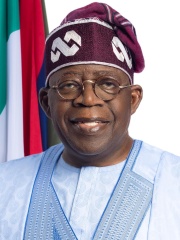
5. Bola Tinubu (b. 1952)
With an HPI of 63.71, Bola Tinubu is the 5th most famous Nigerian Politician. His biography has been translated into 52 different languages.
Asiwaju Bola Ahmed Adekunle Tinubu (born 29 March 1952) is a Nigerian politician serving as the 16th and current president of Nigeria since 2023. He previously served as the governor of Lagos State from 1999 to 2007 and senator for Lagos West in the Third Republic. Tinubu spent his early life in southwestern Nigeria and later moved to the United States where he studied accounting at Chicago State University. He returned to Nigeria in the 1980s and was employed by Mobil Nigeria as an accountant, before entering politics as a Lagos West senatorial candidate in 1992 under the banner of the Social Democratic Party. After the military dictator Sani Abacha dissolved the Senate in 1993, Tinubu went into exile and became an activist campaigning for the return of democracy as a part of the National Democratic Coalition movement. In the first post-transition Lagos State gubernatorial election, Tinubu won by a wide margin as a member of the Alliance for Democracy. Four years later, he won re-election to a second term. After leaving office in 2007, he played a key role in forming the All Progressives Congress in 2013. In 2023, he was elected president, defeating Atiku Abubakar and Peter Obi.

6. Umaru Musa Yar'Adua (1951 - 2010)
With an HPI of 61.59, Umaru Musa Yar'Adua is the 6th most famous Nigerian Politician. His biography has been translated into 63 different languages.
Umaru Musa Yar'Adua () (16 August 1951 – 5 May 2010) was a Nigerian politician who served as the president of Nigeria from 2007 until his death in May 2010. He won the Nigerian presidential election held on 21 April 2007, and was sworn in on 29 May 2007. He had previously served as the governor of Katsina State from 1999 to 2007; and was a member of the Peoples Democratic Party (PDP). In 2009, Yar'Adua left for Saudi Arabia to receive treatment for pericarditis. He returned to Nigeria on 24 February 2010, but died on 5 May.

7. Sani Abacha (1943 - 1998)
With an HPI of 61.21, Sani Abacha is the 7th most famous Nigerian Politician. His biography has been translated into 54 different languages.
Sani Abacha ( 20 September 1943 – 8 June 1998) was a Nigerian military dictator and statesman who ruled Nigeria as military head of state from 1993 following a palace coup d'état until his death in 1998. Abacha's seizure of power was the last successful coup d'état in Nigerian military history. He wielded power with an unyielding attitude and his rule heralded an unprecedented total disregard for human rights with several political assassinations and summary executions of dissidents and political opponents in Nigeria. His rule drew disrepute to the country with Nigeria becoming a pariah state in international relations particularly with regard to the execution of environmental activist Ken Saro-Wiwa. Sani Abacha was considered one of the twentieth century's most corrupt dictators and as a kleptocrat for the alleged embezzlement of US$2–5 billion. Abacha, and his family, allegedly hid most of the loot in Switzerland, as well as in other jurisdictions including Liechtenstein, the United Kingdom and the United States. Abacha's death on 8 June 1998 brought about the Nigerian Fourth Republic a year later and he was succeeded as Nigeria's head of state by General Abdulsalami Abubakar.

8. Moshood Abiola (1937 - 1998)
With an HPI of 60.70, Moshood Abiola is the 8th most famous Nigerian Politician. His biography has been translated into 22 different languages.
Chief Moshood Kashimawo Olawale Abiola , also known as M. K. O. Abiola ( ; 24 August 1937 – 7 July 1998), was a Nigerian business magnate, publisher, and politician. He was the honorary supreme military commander of the Oyo Empire and an aristocrat of the Egba clan. Abiola ran for the presidency in 1993, for which the election results were annulled by then military president Ibrahim Babangida. He would later die in detention after making an attempt to assert himself as the elected president. Abiola was awarded the National honour Grand Commander of the Order of the Federal Republic (GCFR), an honour awarded to only Nigerian heads of state, posthumously on 6 June 2018, by President Muhammadu Buhari, and Nigeria's democracy day was changed from 29 May to 12 June in his honour. Abiola was a personal friend of Ibrahim Babangida and is believed to have supported Babangida's coming to power. Abiola's support in the June 1993 presidential election cut across all geo-political zones and religious divisions. He was among a few politicians to accomplish such influence during his time. By the time of his death, he had become an unexpected symbol of democracy.

9. Yakubu Gowon (b. 1934)
With an HPI of 59.31, Yakubu Gowon is the 9th most famous Nigerian Politician. His biography has been translated into 34 different languages.
Yakubu Dan-Yumma "Jack" Gowon (born 19 October 1934) is a Nigerian general and statesman who served as the military head of state of Nigeria from 1966 to 1975. Gowon was Nigeria's leader during the Nigerian Civil War, also known as the Biafra War where he delivered the famous "no victor, no vanquished" speech at the war's end to promote healing and reconciliation. The Nigerian Civil War is listed as one of the deadliest in modern history, with some accusing Gowon of crimes against humanity and genocide. Gowon has maintained that he committed no wrongdoing during the war and that his leadership saved the country. An Anglican Christian from a minority Ngas ethnic group of Northern Nigeria, Gowon is a Nigerian nationalist, and a believer in the unity and oneness of Nigeria. His rise to power followed the July 1966 counter-coup and cemented military rule in Nigeria. Consequently, Gowon served for the longest continuous period as head of state of Nigeria, ruling for almost nine years until his overthrow in the coup d'état of 1975 by Brigadier Murtala Mohammed.
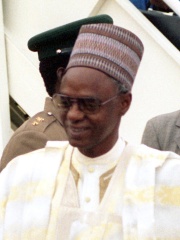
10. Shehu Shagari (1925 - 2018)
With an HPI of 58.25, Shehu Shagari is the 10th most famous Nigerian Politician. His biography has been translated into 35 different languages.
Shehu Usman Aliyu Shagari (; 25 February 1925 – 28 December 2018) was a Nigerian politician who was the first democratically elected president of Nigeria, after the transfer of power by military head of state General Olusegun Obasanjo in 1979, which gave rise to the Second Nigerian Republic. He briefly worked as a teacher before entering politics in 1951; and was elected into the House of Representatives in 1954. At various times between 1958 through independence of Nigeria in 1960 and 1975, he held a cabinet post as a federal commissioner. During these periods, Shagari made significant contributions to various sectors of the Nigerian economy. As Minister of Works, he played a key role in infrastructure development. As Minister of Economic Development, he was instrumental in formulating Nigeria’s post-independence National Economic Plan, and as Federal Commissioner (now Minister) for Finance, he oversaw the launch of the Naira. As president, he prioritized economic development, infrastructure expansion, and industrialization, commissioning the Ajaokuta Steel Mill, the largest steel project in Africa, to lay the foundation for Nigeria’s industrial growth. His administration faced challenges, including economic downturns and political instability. His tenure ended with a military coup in 1983.
People
Pantheon has 29 people classified as Nigerian politicians born between 1900 and 1989. Of these 29, 13 (44.83%) of them are still alive today. The most famous living Nigerian politicians include Olusegun Obasanjo, Bola Tinubu, and Yakubu Gowon. The most famous deceased Nigerian politicians include C. Odumegwu Ojukwu, Murtala Mohammed, and Muhammadu Buhari. As of April 2024, 2 new Nigerian politicians have been added to Pantheon including Babatunde Fashola, and Oby Ezekwesili.
Living Nigerian Politicians
Go to all RankingsOlusegun Obasanjo
1937 - Present
HPI: 63.79
Bola Tinubu
1952 - Present
HPI: 63.71
Yakubu Gowon
1934 - Present
HPI: 59.31
Goodluck Jonathan
1957 - Present
HPI: 58.07
Ibrahim Babangida
1941 - Present
HPI: 57.59
Yemi Osinbajo
1957 - Present
HPI: 57.38
Abdulsalami Abubakar
1942 - Present
HPI: 55.04
Atiku Abubakar
1946 - Present
HPI: 49.34
Namadi Sambo
1954 - Present
HPI: 43.89
Peter Obi
1961 - Present
HPI: 42.58
Babatunde Fashola
1963 - Present
HPI: 39.78
Oby Ezekwesili
1963 - Present
HPI: 37.73
Deceased Nigerian Politicians
Go to all RankingsC. Odumegwu Ojukwu
1933 - 2011
HPI: 68.97
Murtala Mohammed
1938 - 1976
HPI: 67.49
Muhammadu Buhari
1942 - 2025
HPI: 66.95
Umaru Musa Yar'Adua
1951 - 2010
HPI: 61.59
Sani Abacha
1943 - 1998
HPI: 61.21
Moshood Abiola
1937 - 1998
HPI: 60.70
Shehu Shagari
1925 - 2018
HPI: 58.25
Nnamdi Azikiwe
1904 - 1996
HPI: 57.68
Abubakar Tafawa Balewa
1912 - 1966
HPI: 57.45
Johnson Aguiyi-Ironsi
1924 - 1966
HPI: 55.68
Muhammadu Maccido
1928 - 2006
HPI: 53.59
Ernest Shonekan
1936 - 2022
HPI: 53.33
Newly Added Nigerian Politicians (2025)
Go to all RankingsOverlapping Lives
Which Politicians were alive at the same time? This visualization shows the lifespans of the 16 most globally memorable Politicians since 1700.

